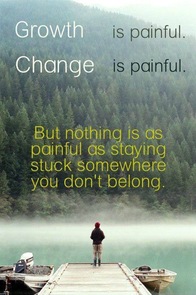Adjustment, Loss, and Grief

During times of transition or change, we feel vulnerable, and feelings of uncertainty can fuel self-doubt and even anxiety and depression. I consider loss to include significant life changes in relationships, job, or abilities. For example, a child may be left very confused about parents divorcing and this impacts all areas of functioning until they can adjust in a way that validates their unique experience. Another example is when someone has experienced an accident or illness that changes their functioning or abilities, and there is a desire to re-define themselves to fit into a new reality.
A chronic or critical illness for you or your loved one is also considered an adjustment, a change in what was "normal", and sometimes anticipating a decline in functioning. My work with individuals and/or their family members around illness involves redefining the self, acknowledging the grief, and being active in "new normal". Often these times trigger old adjustments, life changes, and grief and loss, and processing those connections is critical to cope and move through an illness.
I have had the privilege of working closely with families during the anticipatory stages of grief and after a loved one has passed. This journey is truly unique for each person and I often say to people anticipating or grieving the death of a loved one, "there are no rules about this, no one tells you how to grieve" which can be comforting but also leaves a sense of vulnerability. My goal is to help individuals and families acknowledge the stages of grief and validate their unique journey.
A chronic or critical illness for you or your loved one is also considered an adjustment, a change in what was "normal", and sometimes anticipating a decline in functioning. My work with individuals and/or their family members around illness involves redefining the self, acknowledging the grief, and being active in "new normal". Often these times trigger old adjustments, life changes, and grief and loss, and processing those connections is critical to cope and move through an illness.
I have had the privilege of working closely with families during the anticipatory stages of grief and after a loved one has passed. This journey is truly unique for each person and I often say to people anticipating or grieving the death of a loved one, "there are no rules about this, no one tells you how to grieve" which can be comforting but also leaves a sense of vulnerability. My goal is to help individuals and families acknowledge the stages of grief and validate their unique journey.
